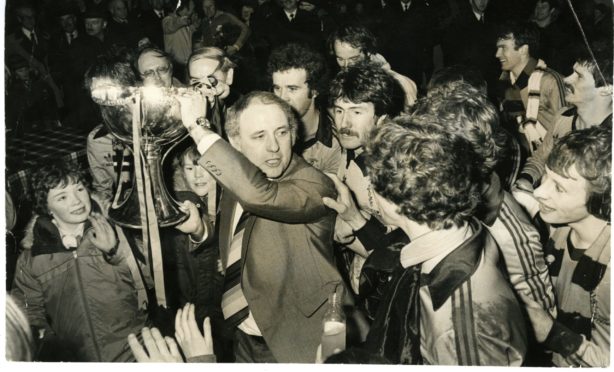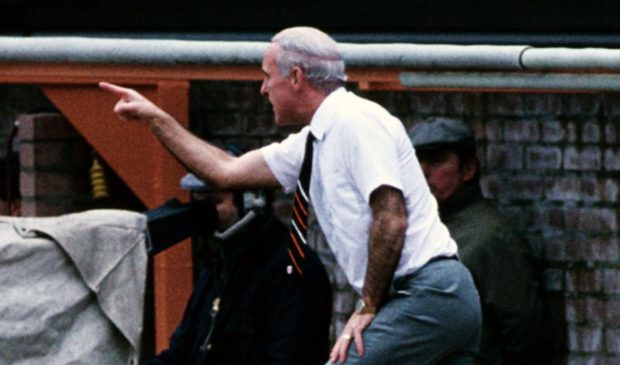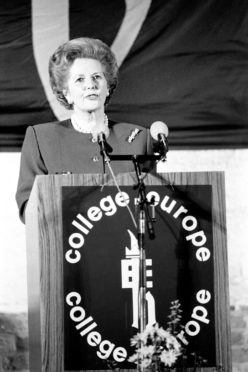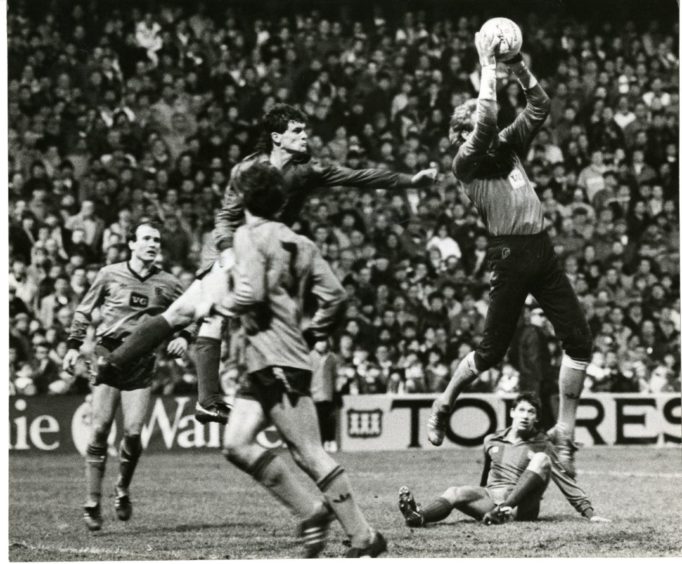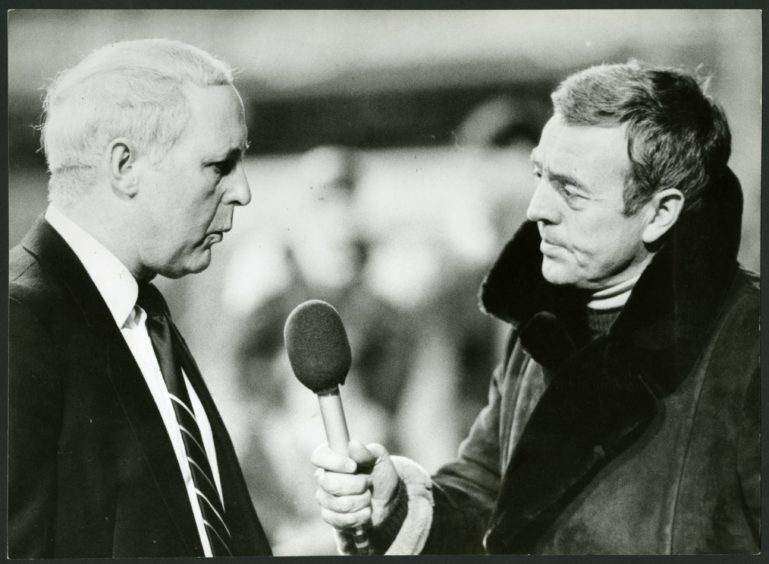Two wonderful pieces of art – enjoyed a year apart – have enriched the memory of Jim McLean.
One was a performance and the other visual but both opened a creative window on the legendary Dundee United manager, whose death was announced on Boxing Day, two months ago this Friday.
The first experience was the gala opening night at Dundee Rep on February 19 last year to see the masterpiece that is the play Smile.
Written by Phil Differ and directed by Sally Reid, it boasted a tour-de-force depiction of McLean by Barrie Hunter as the actor took you back to the days when the great tactician was king of Tannadice.
Amazing accuracy
Every hand gesture and every nuance of speech was captured so brilliantly by Hunter that McLean’s players, who post-show held a question and answer session organised by the Dundee United Supporters’ Foundation, seemed genuinely stunned by the accuracy.
When news broke of McLean’s passing, your mind went back to how Hunter had portrayed him with both real affection and brutal honesty.
There was another trip in the tangerine time machine more recently with a fabulous bit of film posted on YouTube by “Tanaferry.”
It is named Jute, Jam and Jim McLean and formed part of STV’s Scottish Report series.
First broadcast on February 27, 1987, the documentary centres on the upcoming “corner shop against supermarket” match, as it gets labelled by contributing journalist Gerry McNee.
The Tangerines are just five days away from their Uefa Cup quarter-final home first leg against the mighty Barcelona.
As well as capturing the build-up to what was and still is a remarkable football story, the cameras focus on the city of Dundee and its socio-economic struggles in the midst of Prime Minister Margaret Thatcher’s reign.
Red card for Maggie
A year or so later and United’s fans would be joining Celtic supporters in showing Maggie the red card before the 1988 Scottish Cup final she attended at Hampden.
The hook is how the club struggles to get more than six or seven thousand spectators at games, despite their achievements on both the domestic and European stages.
Any United fan will tell you that they had already beaten Barca in 1966, when their club record crowd of 28,000 packed into the stadium. What they won’t recall is that the unemployment rate in Tayside at that time was only 3.6%.
In 1986, just a few months before the second meeting with the Spanish aristocrats, the jobless figure measured 16.5% in the region and Dundee bore the brunt of it, with 6,000 people categorised as “long-term unemployed” (source: Scottish Government Yearbook 1987).
In that year’s General Election, the city would reject Thatcher and the Conservatives and vote in two Labour MPs for the first time, with John McAllion in the east joining Ernie Ross in the west.
With times tough, United weren’t alone in struggling to persuade people to spend precious pounds and pence to watch them rather than use them to buy food or pay bills.
The Barcelona tickets were on sale at £20, which would be the equivalent of £56 in today’s prices.
Of course, that would not have bought you a thread in one of the socks worn by the millionaires from the Nou Camp.
As confirmation of that, the film starts by telling us how Barca striker – and recent England World Cup hero – Gary Lineker has just secured a £1 million boot deal.
Phone fury
It then cuts to McLean in full, furious flow on the phone to the dugout from the executive box above the players’ tunnel. Not surprisingly for those who were around at the time, the gaffer is on Eamonn Bannon’s case.
The dulcet Dundonian tones of Michael Marra singing Hamish the Goalie is the soundtrack for the video, which also features interviews with United historian Peter Rundo and Jim Wilkie, author of the book Across The Great Divide.
Prominence is given to the central role played by Taypools which, even in a city hard hit by recession, managed to provide a constant stream of funding to the Tannadice club. Big transfer fees came in for players like Ray Stewart and Richard Gough but Taypools put the bread and butter on the table.
Chairman George Fox, who would go on to have a stand named after him, knew that and he also knew how a side on such a modest budget managed to battle with the big boys.
His answer: “That’s simple – Jim McLean.”
As with Smile, we are given insights into the manager’s lack of self-confidence.
For example, McLean says: “I would like to be different. I would like to have far more personality than I’ve got. But maybe…I have something on the football side of it. We can’t have everything.”
He adds: “There has definitely been an inferiority complex in the club and a lot of that I must take on myself.”
Barca beaten…again
Only days later, we were shown once again why McLean had no reason to lack self-belief when he led United to a 1-0 victory over Terry Venables’ superstars, thank to Kevin Gallacher’s definitely-meant early goal.
A fortnight later would come one of the greatest-ever European performances by a Scottish club when the Tangerines beat Barca 2-1 in the Nou Camp in the second leg on March 18, courtesy of goals from John Clark and Iain Ferguson.
As the film reaches its conclusion we go back to the beginning, with McLean – having withdrawn himself from the touchline – sitting fidgeting in his seat during a 2-0 win over Motherwell.
He lifts the phone receiver and passes on a message meant for his assistant boss Gordon Wallace.
“Tell Gordon (that) Bannon is having an absolute nightmare. He must get him stirred up.” A few minutes pass by then McLean has seen enough: “Come on, get Bannon off.”
It was a reminder of how he used to get wrapped up in the game and how he always demanded more from his more skilful players, which Bannon certainly was.
McNee speaks of McLean’s “obsession” with the game and the man himself admits: “I know football means too much to me and I wouldn’t wish on my own worst enemy to be obsessed by football the way I’m obsessed by football.”
McLean may have thought of himself as lacking personality and confidence but, even though he may not have realised it at the time, his managerial genius helped bring joy and pride to a city just at a time when the people most needed both of those precious things.
